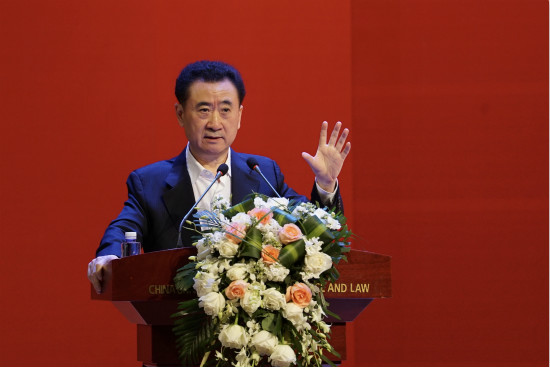Chairman Wang Jianlin Gives Speech at CUPL: Wanda as Standard-Bearer and Practitioner of Building China’s Cultural Confidence
13.05.2017 Wanda Group Chairman Wang Jianlin made a speech on building China’s cultural confidence at China University of Political science and Law on May 12, 2017.
Wanda Group Chairman Wang Jianlin made a speech on building China’s cultural confidence at China University of Political science and Law on May 12, 2017.
Following is the full text of the speech.
This speech was scheduled more than one year ago, for this time decided by CUPL president Prof. Huang. At that time, I was given three topics to choose from, and they were entrepreneurship, innovation, and cultural confidence. As I had spoken a lot on the first two topics, I chose the topic of cultural confidence for today’s speech, on the theme of “Let Our Cultural Confidence Shine”.
As there hasn’t yet been much discussion about cultural confidence in China, my understanding of this topic might not be spot on. I will try to share my own understanding and reflections on the topic.
I. Why to Have Cultural Confidence
General Secretary Xi Jinping once called on the whole nation to have confidence in its chosen path, guiding theories, and political system, and above all to have confidence in China’s culture. Cultural confidence, as I understand it, is the full understanding and appreciation and carrying forward by a nation and race of its culture.
Why do we emphasize cultural confidence? What role does it play? I think cultural confidence is very important in three ways:
First, cultural confidence strengthens national cohesion. A stronger cultural confidence means a stronger national pride and greater national cohesion. Chinese people also call themselves as Han Chinese or Tang Chinese. Why? Because the Han and Tang dynasties are the high points of Chinese civilization, whose strong economy and culture we pride ourselves on.
This pride and confidence has continued to this day. This cultural confidence remained intact even when the Chinese nation went into low ebb three hundred years ago, and gave us hope and belief in the nation’s future during the great crisis of the war of resistance against Japan. It can be said that this cultural confidence and the hope for the nation’s better future have closely knit all Chinese around the world together.
Secondly, cultural confidence improves national competitiveness. National competitiveness comprises hard power and soft power, with hard power covering such aspects as economy, military and technology, and soft power covering culture, education, politics, diplomacy, development model, and others, with culture at the core. A stronger culture directly translates into a stronger national competitiveness.
In the 1970s and the 1980s, Japanese corporations went on an epic buying spree in America, acquiring so many American companies that the Americans were worried that Japan would buy up America. Some people wrote to the then U.S. president calling for restriction on Japanese buying of American assets. It was said that the president made a famous remark in response, to the effect that America can sell anything as long as things like Disney and Hollywood are not sold to the Japanese and there is nothing to be worried about. This episode reflects the importance of cultural prowess.
Thirdly, cultural confidence is the lifeblood of a nation. Of the four great ancient civilizations — the ancient Egyptians, the ancient Mesopotamians, the ancient Indians, and the ancient Chinese, only the Chinese civilization has managed to survive continuously. There were not without periods in which the Chinese nation was under foreign rule, such as during the Northern Wei Dynasty, the Yuan Dynasty and the Qing Dynasty, but instead of conquering the Chinese nation, the foreign nations were absorbed by the Chinese culture and became part of the Chinese nation. This shows the great power of the Chinese culture which we have every reason to have confidence in and feel proud of.
To strengthen our cultural confidence is to ensure that the Chinese civilization will be carried forward for ever and continue to flourish and bloom in the world, escaping the fate of other civilizations that disappeared.
II. How to Build Cultural Confidence
For a very long period in history, from more than two thousand years ago to as recently as four hundred years ago, foreigners admired the Chinese far more than the other way around. At that time, the royal families and nobles of Europe prided themselves on having a room decorated in the Chinese style or dedicated to Chinese articles. Peter the Great of Russia, for example, had two Chinese mansions, one in Moscow and the other in St. Petersburg. Emphasizing cultural confidence today, in my view, is to reassert the proud position of the Chinese culture in the world and provide a cultural foundation for the great renewal of the Chinese nation. There are many things to do to rejuvenate the Chinese nation, but the first thing is to have confidence in attaining the goal, thus striving for its accomplishment.
How to build our cultural confidence? I have three suggestions.
1. Vigorously carry forward the traditional culture
Cultural confidence, first of all, has to be based on specific content. Chinese culture encompasses a lot of content. According to my understanding, excellent traditional Chinese culture should be taken as the main content of Chinese culture, and this is for two reasons: First, excellent traditional culture is the fountainhead of Chinese culture and is what our current culture has developed from and what has shaped our world view and values. Secondly, excellent traditional culture is the common awareness of all Chinese around the world. Chinese not just live in China but there are nearly 100 million overseas Chinese. All Chinese identify themselves with traditional Chinese culture.
2. Stop blindly worshipping everything foreign.
China’s per capita GDP has reached nearly USD 10,000, and China’s economic development has reached a new stage, but the tendency to admire foreign things is still a common phenomenon in China. For example, foreigners have the say on many affairs from scientific research to arts to awards, and even the financial standing of a company or the academic standing of a university is subject to the rankings prepared by foreigners. If your company does well, but America’s top three credit rating agencies don’t think so, then your company will still face a higher financing cost; if they rate your company favorably, then you enjoy a lower financing cost. The world’s three major university rankings are also produced by foreigners. Their criteria are actually not necessarily entirely fair and just.
There is a dialectical relationship between cultural confidence and foreign worshipping. If the foreign worshipping mentality cannot be done away with, cultural confidence cannot be firmly established.
3. Promote Chinese culture globally
Culture is intangible and invisible, but can be shown through things tangible and visible. Promoting the Chinese culture globally is no slogan and has to be achieved through specific actions. In addition to promoting the Confucius Institute worldwide, I think it is also necessary for China to build its global channels for its movies, plays, music, online services and books and establish a strong presence in international cultural communications. Only after these channels are established can China make its voice fully heard by the world and can our cultural confidence gradually take hold. Our cultural confidence will be truly established when China gets a decisive say in international cultural communications.
III. Cultural Confidence in Action at Wanda
Right now, I made two points on cultural confidence. Here I wish to introduce how building cultural confidence is put in action at Wanda. Cult






